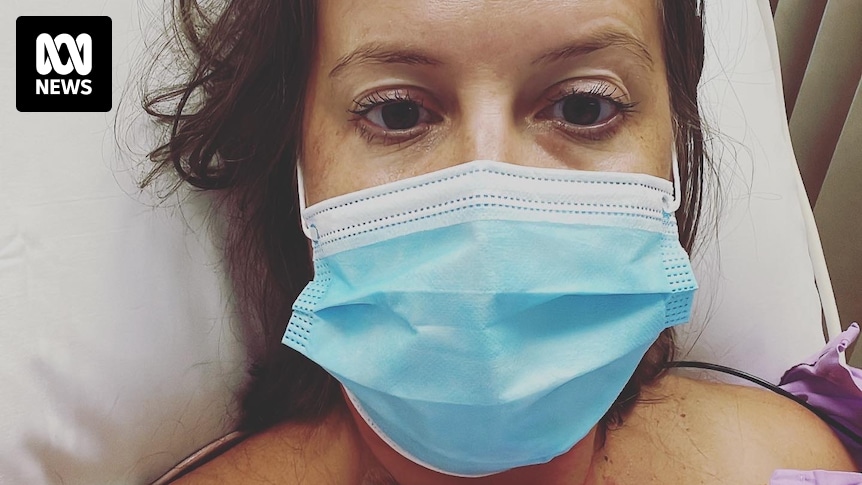When Queensland woman Jo Yates started needing the toilet more often and feeling overly full after eating, she thought it might be due to a change in her diet.
“One of my friends had recommended fasting so we were doing that,” she said.
“I kind of put it down to aging and fasting.”
However, the Noosa resident, who had always lived an active and healthy lifestyle, soon discovered she had the nation’s deadliest gynaecological cancer.
She was diagnosed after a pap smear, which typically only picks up cervical cancer, in late 2021.
Her female doctor had initially suspected endometriosis — a condition where cells similar to those that line the uterus grow in other areas of the body.
“Ovarian cancer symptoms are so innocuous a lot of GPs will even dismiss it as something else and might not test for it,” Ms Yates said.
“I just had a few strange cells so luckily my doctor sent me for further testing and an ultrasound.
“In that ultrasound, they actually found I had tumours on both ovaries.”
Relationship ‘baptism of fire’
Ms Yates, then aged 42, had not planned to have children but was still shocked to learn she would need a hysterectomy and chemotherapy to treat the cancer.
“I’d only met my current partner three months before [the diagnosis] and he wanted kids,” she said.
“I told him I’d never wanted them and that I would talk to him about it, but it probably wasn’t going to happen.
“Then that choice got taken away.”
Three years later, Ms Yates has finished her chemotherapy and her partner Nick Goetting has remained by her side.
“That was a bit of a baptism of fire,” Ms Yates said.
“He’s a fair bit younger than me so everyone was like, ‘He’s going to leave because he’s young and you’ve got cancer’, but he’s stuck around … he’s very supportive.”
The earlier the better
Professor Caroline Ford is part of a research team developing an early detection test for ovarian cancer at the University of New South Wales.
The team, led by Dr Kristina Warton, hopes to one day have a test that could become as routine as cervical screening tests and mammograms.
Professor Ford said Ms Yates’s experience of a GP noticing abnormal cells following a pap smear, only happened “very occasionally”.
“A pap smear is not a test for ovarian cancer … there is currently no test,” she said.
“Our team is developing a blood test that can detect tiny amounts of ovarian-cancer-specific DNA.
“We have been working a number of years to ensure that this liquid biopsy is highly sensitive and specific so that it can detect the earliest cancers and not any false positive signals.”
An estimated 1,050 women died from ovarian cancer last year, according to data from the Australian Institute of Health and Welfare.
Those diagnosed only have a 49 per cent chance of surviving at least five years.
Professor Ford said the test they were developing could potentially increase that rate to 90 per cent, by catching the cancer while it was confined to the oviducts.
Attacking the body by stealth
Ovarian cancer is known as the “silent killer” because by the time many women realise they have it, it’s too late.
Fellow researcher Dr Jessica Holien said the symptoms could easily be confused with other conditions.
“As a woman, we often feel abdominal bloating, feeling full really quickly, frequent urination, any sort of pain in your back, abdomen or pelvis,” Dr Holien said.
“Not to mention constipation or diarrhoea, tiredness, menstrual irregularities — those sorts of things we often feel and can often discount.
“It doesn’t hurt to make an appointment with your doctor if you have these continuous symptoms.”
Dr Holien has been exploring treatment options for mucinous ovarian cancer (MOC), a rare subtype of the disease affecting less than 5 per cent of patients.
“MOC doesn’t respond the way other ovarian cancers do and unfortunately there is an extremely poor survival rate,” she said.
“We’ve been trying to find new targets that we can identify in MOC that we can then design drugs against, and hopefully find new treatments for these patients.”
Hopes for the future
Professor Ford hoped for a “much more open conversation” in Australia about menstrual health and menopause.
“So that people understand the range of ‘normal’ and when to seek medical advice,” she said.
“We need to remove the stigma.”
Ms Yates has created an online support group for patients and has been sharing her story ahead of Gynaecological Cancer Awareness Month in September.
She still has regular check-ups and said the experience had changed her both physically and mentally.
“Coming up to my tests there’s always a bit of anxiety … I worry every lump and bump is cancer,” Ms Yates said.
“But I don’t stress about small stuff anymore and I’ve got a much more positive outlook on life.”
Get our local newsletter, delivered free each Wednesday




